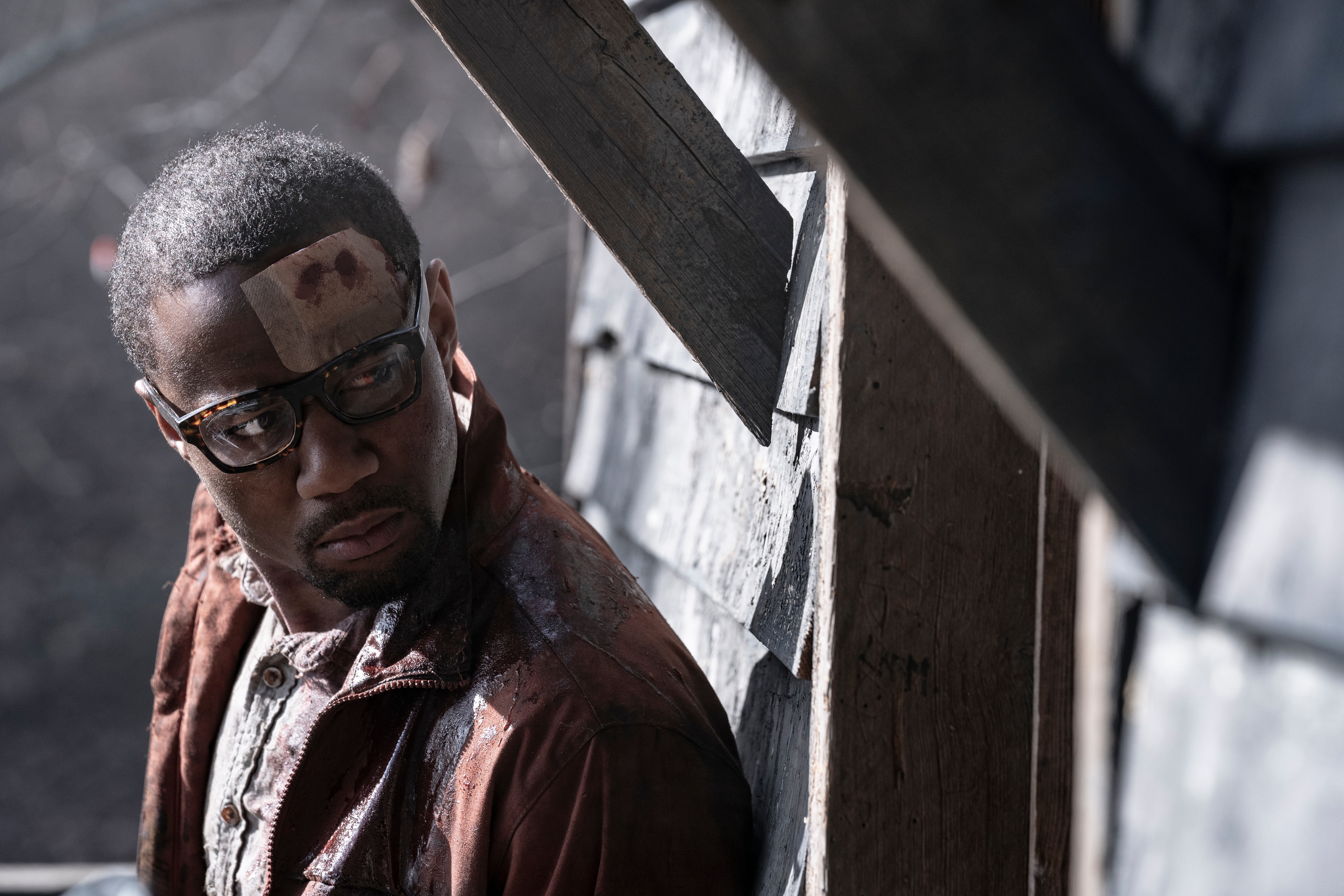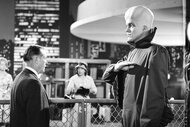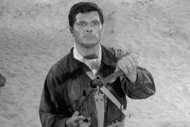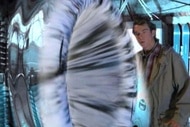Create a free profile to get unlimited access to exclusive videos, sweepstakes, and more!
Jessie T. Usher and his 'Tales of the Walking Dead' co-stars share stories of spiders and fights
The cast of the latest Tales of the Walking Dead episode, "Devon," give some insight into shooting the dark episode.

The Tales of the Walking Dead anthology series continues to give fans of the world glimpses into the stories of other survivors around America after the rise of the titular Walking Dead. This week's installment, "Devon," reveals the non-linear story of a man who wakes up in a forest, injured and shackled to a walker body with no memory of how he got there. Actor Jessie T. Usher (A-Train in The Boys) plays that man, Devon, who comes to remember his circumstances and the danger that he's in as the episode unfolds. Right next to him are actresses Embeth Davidtz (Amanda) and Loan Chabanol (Nora) who initially welcome Devon into their Montreal suburban enclave but then accuse him of murder.
There are twists and turns galore inside the 45-minute episode with a bleak ending that could be straight out of a Shirley Jackson novella. SYFY WIRE recently got on a Zoom with all three actors to find out what it was like shooting the intense episode and what ended up being their favorite moments getting to play in The Walking Dead universe sandbox.
Starting with Jessie, Devon is a character entirely unlike A-Train in The Boys. Was playing him essentially a palette cleanser for you or did you just want to be in a Walking Dead episode?
Jessie T. Usher: It was a little bit of both.The demeanor that he has and just who he is as a person is completely different than A-Train. It was nice to do something fresh and new. But also it's The Walking Dead universe. [Laughs.] I'm a fan of it. I talked to [director Michael Stratzemis] and [writer Channing Powell] and I heard the passion spewing out of them. It just excited me. Now I'm in this world where I'm playing a character who is amongst the elements that are totally different than anything I've ever done. There's a love aspect to it too, so just so much to play around with. To even be considered to play a character as complex as this was a joy.
Embeth, you've done plenty of sci-fi projects. What was the lure for you?
Embeth Davidtz: Honestly, but to be the cool mom for my 16-year-old so he could say to his friends, "My mom's doing The Walking Dead." The whole temperature of the house changed after that. [Laughs.] But I was drawn to the way it was written. There was all this mystery in her. Also being written backward, it took me a minute as I was trying to piece together what happened. Following her and then understanding how diabolical it was. The motivation behind anything can be made real, and is real, if you're a mother and you've got to protect your offspring. I thought the writing was really great. I thought it was really clever. I thought it could have been a period piece but wasn't which gave it extra flavor and a very haunting quality.
Loan, Nora has quite the arc from kind nurturer to murderer in the end. How did you track that progression assuming you didn't get to shoot the episode in order of events?
Loan Chabanol: We actually started with some of the end scenes. It was really challenging to do that. Thank you for that question, because I was wondering the same thing when I read the script. I was drawn by her caregiver manners, and the pureness that she could reflect on Devon and see themselves in each other. And then because of the situation and high stakes, then she has to make a decision and this is her loyalty that is being put at stake. Who do you choose, if not your family? And then what does it mean in the times of the apocalypse? It's basically ganging up on one person and the answer is death! It was so intense. And I wasn't sure how far I should go. But Michael allowed me to push and asked me to push. There was a moment that I saw really true fear in the eyes of Jessie and I'm like, "I think I'm right there!" [Laughs.]
Jessie, talk about tracking the gentle blossoming between Devon and Nora in essentially two scenes.
Usher: They were just in a very intense state of desperation and falling in love with the innocence within each other. It was almost beautiful because we were able to do these really intense, high-energy, crazy, bizarre scenes, but we know that our characters were uncomfortable in these moments. We get to catch our breath across from each other. We get to lock eyes and finally have a moment of warmth and feel whole again. It was nice to have that and that's what you see on camera. It's not that we have to make you believe that they're in love, or they're in a relationship, but you get to see that they're up against something that neither of them are cut out for. And the only thing that makes them feel good is each other. And that's the love that you see on camera between these two so it was it was actually kind of nice.
Amanda says that sometimes "murder is mercy" which is a chilling point of view that she acts upon. Did you ask Channing about the backstory for Amanda and what got her to this place?
Davidtz: I asked a lot of questions at the time. I think so much of her story is rooted in her history. The father doesn't come back from the war and the son, who's got the scar on his neck, it almost goes by in that quick dinner party scene. She's handing the food out as they're dishing up with Jessie and she says, "He almost didn't come back." The mother/terror thing [is strong]. My one kid had a horrible bike accident and a couple of years later another one was at UCLA with this terrible meningitis thing and I remember the deals with God that you literally make: "I'll do anything." I think her backstory is just at all costs to protect this child. She has a sister, obviously, and loves her sister. But I think for her, she's just trying to protect him. And I think for her that motivated everything.
Jessie, let's talk about Devon's desperate speech to the rabid citizens that tried to kill him. He makes one more plea to their humanity. Does Devon think he can turn their hearts in that moment?
Usher: The downfall of Devon is that he still thinks that there is a world out there like what he knows and what he once had that is still attainable. And I just don't that's a realistic mindset anymore. There's always going to be a warped version of that and he kind of has to accept it if he expects to survive this thing. But he's refusing to. He's sure that one day he will find what he once had and that people will still see the world the way that he does. The circumstances are not that anymore.
I think when he gives the speech. He's very hopeful about it. He's almost begging them to see things the way that he does and that the world can still be beautiful. And they react in a very different way. I think that when he walks away, it was more so of him acknowledging that they are not the same. At least that community will not be what he wants them to be, so he's just leaving them behind. He can't stick around any longer. Next thing is gonna happen, they're just gonna kill him.
All three of you have been on an array of different projects, but did anything about being in a Walking Dead episode distinguish itself for you?
Usher: Working with the elements on this was, by far, the craziest part about being on the show. There was a time when I was dragging a walker through the woods and then we jumped underneath a stump. They had just dug that stump up. We're in the dirt. We're in the mud. There was a take where I'm sitting there and I'm talking to the walker and this guy's walking by with a lantern, right? As he gets by, there are three spiders that descend down from the top of the tree trunk. In any other case, we probably would have yelled "Cut!" and they would have cleaned it out. But in this scene, I just took my other hand and squished them up against the mud and just kept going because we're actually in these elements and there's no getting around it. [Laughs.]
Chabanol: The element of the circumstances and the sets and the cold, as we had a whole night shooting at the cemetery. I remember trying to be angry and I'm like, "Okay, it's not hard I'm freezing!"
Davidtz: Two things: just being in the slime and the moment of transition falling into the battery acid. I was like, "Oh, my God, I can't believe I have to do this!" Then boom! They cleaned me up and I had to do it again. But also having a really physical fight. It's a long time both in movies or in life that I've had someone throw me around, and I've thrown them around. I was like, "I still got it." I had a couple of bruises and my back was a little sore the next day, but dang, I did it!
New episodes of Tales of the Walking Dead air on Sunday nights on AMC.
Looking for more scares? Stream tons of great horror movies on Peacock.


























